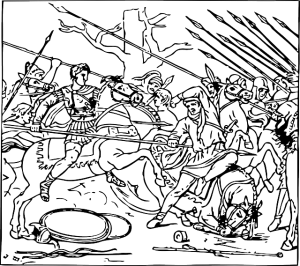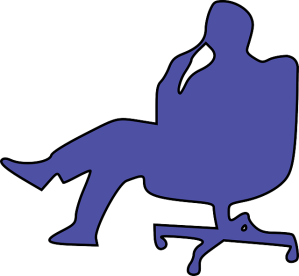David J. Rogers writes for artists, writers, performers, and creative people of all kinds and has also provided consulting in strategy and leadership to some of the world’s largest corporations. He has lectured on these subjects extensively in North America and Europe. His best-selling book Waging Business Warfare: Lessons from the Military Masters in Achieving Competitive Superiority–now a new, revised, and updated E-book–has been called a business masterpiece.
“The responsibility for a host of a million lies in one leader who is the trigger of its spirit.”(Ho Yen-His)
 The greatest competitive leaders in business, whatever the industry, are exceptional. They may be anywhere in the organization—as is also true of leaders in warfare. They are out of the ordinary because they combine a complement of qualities that equip them perfectly for a leader’s life but that are only rarely found together in one individual. They are knowledgeable, talented, creative, intelligent, energetic, flexible, and driven. They are obsessed with the need to take direct action and mix it up with the competition, and they are savvy strategic thinkers.
The greatest competitive leaders in business, whatever the industry, are exceptional. They may be anywhere in the organization—as is also true of leaders in warfare. They are out of the ordinary because they combine a complement of qualities that equip them perfectly for a leader’s life but that are only rarely found together in one individual. They are knowledgeable, talented, creative, intelligent, energetic, flexible, and driven. They are obsessed with the need to take direct action and mix it up with the competition, and they are savvy strategic thinkers.
Hannibal, the Carthaginian (247-183 B.C), was a true master of strategy. In fact, he is called the father of strategy. Napoleon considered him superb in every aspect of warring, and the Duke of Wellington thought him to be the single greatest soldier in all of history. To this day Hannibal’s victory against the Romans, commanded by Varro at Cannae in 216 B.C., is considered the most perfect tactical battle ever fought. Hannibal’s army of 50,000 annihilated the Roman army of 86,000.
Before the battle began, Hannibal, knowing the importance of a leader keeping his people informed, called his army together and addressed them. He told them that at a certain point during the fighting it would appear that they were about to lose, but to have courage and have no fear because what would be happening then was part of his plan, and soon the tide would turn. It has been said that the mind of the leader is passed on to ten thousand subordinates. A great leader is an inspiring leader.
How could a much smaller army beat a larger one, and so decisively? The historian Polybius provides an important answer: it wasn’t Hannibal’s soldiers or order of battle that made the Carthaginian army superior to the Romans. It was Hannibal’s superior personal skills. Then Polybius makes a matter-of-fact comment that carries immense implications for businesses vying for competitive excellence: “As soon as the Romans found a general who equaled Hannibal in ability, they immediately defeated him.”
And how could a little pipsqueak of a company like the WD-40 Company with its minute work force consistently outcompete giants Du Pont, 3M, and Pennzoil the way Hannibal beat the Romans?
In short, a contest within the contest between the Carthaginian and Roman armies was the contest between leaders. The better leader won; the less capable leader lost. More than 135,000 men took part in the battle of Cannae, each pitting his abilities against his counterpart on the other side. Yet it was the qualities of just two human beings—Varro and Hannibal— which stood out and dominated the day.
 The situation is precisely the same in business competitions. Many companies have had all the material resources necessary to gain the advantage over competitors but weren’t able to do so until the right leader with the right vision, right strategy, right plan, and right insights into how to manage people took charge. We should guard against becoming so accustomed to discussing competitions between businesses that we forget that businesses don’t run themselves: people run them. We shouldn’t forget for a moment that behind the corporate names GE, Procter & Gamble, IBM, McDonald’s, Toyota, GM, Microsoft—and behind their every strategic and tactical move are the leaders who are pitting their quality as leaders against the quality of competitors’ leaders.
The situation is precisely the same in business competitions. Many companies have had all the material resources necessary to gain the advantage over competitors but weren’t able to do so until the right leader with the right vision, right strategy, right plan, and right insights into how to manage people took charge. We should guard against becoming so accustomed to discussing competitions between businesses that we forget that businesses don’t run themselves: people run them. We shouldn’t forget for a moment that behind the corporate names GE, Procter & Gamble, IBM, McDonald’s, Toyota, GM, Microsoft—and behind their every strategic and tactical move are the leaders who are pitting their quality as leaders against the quality of competitors’ leaders.
CEOs know how integrally leadership ability bears on the well-being of their corporations. When 300 of them around the world were asked what they would look for in their successors, “personal leadership style” was the most sought-after attribute. “Aggressive competitive outlook” was second. Who a leader is and what he or she is made of and how clear a thinker may be more important than all the other company resources, including size and wealth.
Every strategic and tactical move reflects the minds, the spirits, and the personalities of those leaders. However much information the business man or woman or entrepreneur has in hand–studies, reports, analyses, anecdotal stories, scenarios–strategic decisions require problem-solving under shifting, loosely-defined, ill-structured circumstances. They are made in a kind of fog and because of the fog always require of leaders qualities of decisiveness, courage, and clear thinking.
 Effective leader-strategists are thinkers with a two-pronged ability. First, they are sensitive to the complexities of the problems they are facing and able to process multiple perspectives. They try patiently to understand the situation objectively and to penetrate the problem to its core. They also consider a range of goals that are sometimes inconsistent before considering a number of solutions and arriving at a satisfactory answer. Then, second, they are equally adept at integrating the perspectives into a coherent viewpoint, in this instance, a strategy. They are not conservative in their thinking, but are independent, open-minded, and flexible.
Effective leader-strategists are thinkers with a two-pronged ability. First, they are sensitive to the complexities of the problems they are facing and able to process multiple perspectives. They try patiently to understand the situation objectively and to penetrate the problem to its core. They also consider a range of goals that are sometimes inconsistent before considering a number of solutions and arriving at a satisfactory answer. Then, second, they are equally adept at integrating the perspectives into a coherent viewpoint, in this instance, a strategy. They are not conservative in their thinking, but are independent, open-minded, and flexible.
People with little strategic ability, being less complex thinkers, think simply. They work with only a single, simplistic perspective, and are generally unwilling or unable to consider alternative solutions. They are impatient and evaluate quickly and then turn to other matters. Their thinking tends to be rigid, dogmatic, and inflexible, a world removed from the more active, quick, alert, and subtle mind of the superb leader-strategist.
French colonel Ardant du Picq (1821-70) made highly detailed and scrupulous studies of the factors leading to success in battle. His most fundamental conclusion was that “It is the mind that wins battles; that will always win them, that always has won them throughout the world’s history.”
In his Art of War, Sun Tzu (400-320 B.C.) put the issue quite simply: any commander will be able to forecast which side will win by answering the question, “Which of the two commanders has the most ability: me or him, (or her)?”
It is minds that win business competitions—often one woman, one man sitting in an office alone, thinking.
© 2015 David J. Rogers
For my interview from the international teleconference with Ben Dean about Fighting to Win, click on the following link:
Order Waging Business Warfare: Lessons From the Military Masters in Achieving Competitive Superiority
or
Order Fighting to Win: Samurai Techniques for Your Work and Life eBook by David J. Rogers
or


Reblogged this on stabiaphix space art.
LikeLike
very instructive
LikeLike
Thanks Victor. I hope you come back to the blog again. Best.
LikeLiked by 1 person